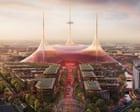

Manchester United's ambitious plan to construct a new 100,000-seater stadium, dubbed the "Wembley of the North," has encountered significant obstacles. The project, envisioned as the centerpiece of a broader regeneration of the Old Trafford area, is facing delays due to land acquisition issues.
The primary sticking point revolves around the Freightliner Terminal located behind the Stretford End. This terminal occupies land crucial for the stadium's construction, and negotiations between Manchester United and Brookfield, the landowners, have reportedly stalled. The Daily Mail suggests that Brookfield is attempting to capitalize on the land's strategic importance by demanding a higher valuation.
To address this impasse, Lord Seb Coe, who played a leading role in London's successful bid for the 2012 Olympics, has been appointed to lead the Old Trafford Regeneration Project. As "Chair-Designate" of the Mayoral Development Corporation (MDC) for the Old Trafford Regeneration project, Coe possesses considerable authority to potentially resolve the land dispute. Should an agreement remain elusive, Coe could exercise his power to initiate a compulsory purchase order, compelling Brookfield to sell the land.
Despite these challenges, the stadium is still anticipated to be ready for the 2030/31 season, and a bid is underway to host the 2035 Women's World Cup Final at the new venue.
The club officially confirmed their intentions to build a new stadium in March 2025, after years of speculation. Conceptual images and scaled models, designed by Foster + Partners, were unveiled, showcasing a vision for a world-class stadium and surrounding district. Sir Jim Ratcliffe, co-owner of Manchester United, emphasized the importance of the project, stating that the current stadium has "fallen behind the best arenas in world sport". He believes the new stadium will not only transform the fan experience but also act as a catalyst for social and economic renewal in the Old Trafford area, creating jobs and investment.
Omar Berrada, chief executive of Manchester United, echoed this sentiment, expressing the club's long-term objective to have "the world's best football team playing in the world's best stadium". The Old Trafford Regeneration Task Force conducted feasibility studies and gathered input from fans and local residents, ultimately concluding that a new stadium is the optimal path forward.
The project aligns with the government's growth agenda, with the potential to deliver an additional £7.3 billion per year to the UK economy. It is also projected to generate approximately 92,000 new jobs, construct over 17,000 new homes, and attract an additional 1.8 million visitors annually.
The club has been exploring various funding options, potentially including public-private partnerships, to power the regeneration of the area. However, it has been confirmed that Manchester United is not seeking public funds for the stadium's construction itself.